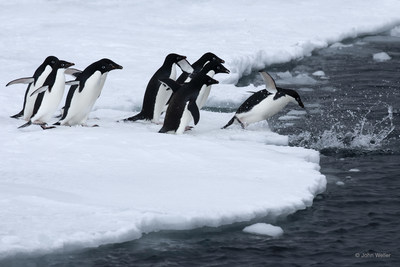

HOBART, Australia, Oct. 21, 2018 /PRNewswire/ -- As a new report from the Intergovernmental Panel on Climate Change (IPCC) warns that increasing global temperatures could cause catastrophic ice melt ice melt in East Antarctica, members of the Antarctic and Southern Ocean Coalition (ASOC) are urging the Commission for the Conservation of Antarctic Marine Living Resources (CCAMLR) to take action this year and designate marine protections (MPAs) in the Southern Ocean.

CCAMLR's annual meeting begins in Hobart today, where members from 24 nations and the European Union (EU) can break the seven-year stalemate that has stalled the designation of an MPA in East Antarctica and move to deliver on its commitment to establish a full network of marine protected areas (MPAs) in the Southern Ocean.
"The Southern Ocean supports everything from colossal squid to penguins, seals, and whales. It is home to some of the world's most intact large marine ecosystems," said Claire Christian, Executive Director of the Antarctic and Southern Coalition.
"Large-scale, no-take MPAs are an effective way to protect these species and their ecosystems. They also provide reference areas for science, and improve resilience to climate change."
In 2016, CCAMLR made history when it designated a MPA in the Ross Sea spanning 2.06 million square kilometres. Members of ASOC hoped that an effective MPA off the coast of East Antarctica would be established at last year's meeting but CCAMLR failed to deliver after getting support from all member states except Russia and China.
"In the seven years of delays to designate the East Antarctic MPA, Adelie penguins have suffered multiple unsuccessful breeding seasons, and Antarctica overall has lost more than 1 trillion tons of ice. Meanwhile, the planet continues to warm. Marine protections in East Antarctica, the Weddell Sea and the Antarctic Peninsula will help safeguard critical habitat in these regions and the unique biodiversity found there," said Andrea Kavanagh, director of The Pew Charitable Trusts Antarctic and Southern Ocean work.
"There is no more time for delays. CCAMLR's commitment to a full network of MPAs must continue this year with a designation."
Marine protection emerged as an important global issue in 2016 when the International Union for the Conservation of Nature (IUCN) recommended protecting at least 30 percent of the global ocean. Currently, just 3.6 percent of the world's oceans are fully protected.
A proposal to protect the Weddell Sea has also been submitted and could be agreed upon during this year's meeting.
"People all around the world – including over two million people calling for an Antarctic ocean sanctuary in the Weddell Sea – are looking to their leaders to show the vision and ambition needed to deliver real protection for the oceans and the wildlife that call them home," said Frida Bengtsson of Greenpeace's Protect the Antarctic campaign.
"This vast 1.8 million square kilometre reserve would form the centrepiece of an essential network of ocean sanctuaries in the Antarctic. At five times the size of Germany, it would help to preserve one of the world's most important carbon stores and allow penguins, seals and whales to recover from the pressures they are facing."
A third MPA proposal has been submitted to the Commission by Argentina and Chile, outlining areas in the Antarctic Peninsula that would help safeguard critical foraging and nursery grounds for penguins, seals, whales, seabirds, and Antarctic krill — a lynchpin species in the Southern Ocean.
"The Antarctic Peninsula is a natural wonder. A wildlife hotspot home to a range of iconic biodiversity, it also bears the brunt of rapid environmental changes and human pressures. It's where most krill fishing occurs, tourism is on the rise and ocean warming is accelerating glacier retreat. Establishing a network of marine protected areas will help safeguard a thriving wild Antarctica with a diversity of life for future generations," said Chris Johnson, WWF's Antarctic Programme lead.
ASOC will be present as an observer at the CCAMLR meeting and has commissioned a mural in Hobart to showcase the rich ecosystem that member governments have the opportunity to protect with a network of marine protected areas. The mural, which will be painted by Topsk on Murray Street in the city centre from Monday 22 October until Wednesday 31 October will be shared with the world through daily time-lapse videos on ASOC's website (www.asoc.org) and social media (www.facebook.com/antarcticsouthernocean).
The CCAMLR meeting runs for two weeks and ends on Friday, November 2, 2018.
SOURCE Antarctic and Southern Ocean Coalition
